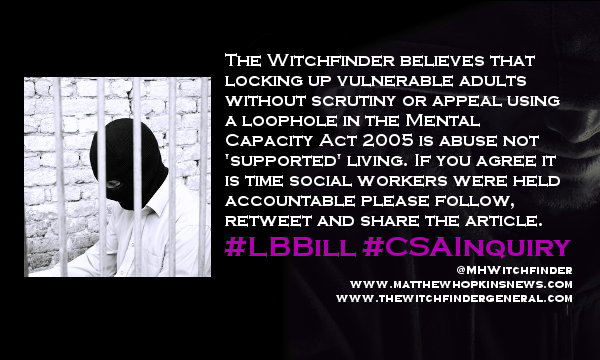The Witchfinder comments on the legal implications of a recent article by Mark Neary, especially in light of Baker J’s recent judgement in AJ (Deprivation Of Liberty Safeguards) [2015] EWCOP 5.
I was horrified to read Mark Neary’s recent article about the reality of ‘supported living’ in some local authority facilities.
Mark had identified a supported living facility in a local authority catchment area. The facility was originally a care home with 20 rooms.
It was converted to ’20 supported living studio flats’.
The reality he describes is of a building with 20 ‘flats’, 2 toilets, 2 bathrooms and fewer staff. Leaving aside the poor quality of the care provided, your Inquisitor is concerned with the Deprivation of Liberty issues. Why?
The Deprivation of Liberty Safeguards do not apply to supported living arrangements.
Mark describes the unit as having some doors that are locked and, presumably therefore some residents who are ‘not free to leave’ and are effectively supervised. In short they are deprived of their liberty. Because the DoLS do not apply in ‘supported living’ situations, the only way to make such a deprivation of liberty lawful is an order of the Court of Protection, with regular reviews. Furthermore, if the person wants to appeal then the social workers must help them.
Unfortunately, there are a number of local authorities who find this process expensive. Indeed, even with the DoLS there are those who simply ignore their statutory duties.
I had not intended originally to comment on AJ because Lucy Series at The Small Places did such an awesome job. However I think the case dovetails with Mark’s observations so well it is worth comment. In AJ an unfortunate elderly lady was placed in a care home.
AJ did not wish to be in the care home but the local authority appointed RPR did not assist her in challenging her detention. The Court found that –
“36 .In domestic law, the fundamental principle to be applied by the Court of Protection in cases of deprivation of liberty was summarised by Peter Jackson J in Neary v LB of Hillingdon [2011] EWHC 1377 (COP) at para 202: “… there is an obligation on the State to ensure that a person deprived of liberty is not only entitled but enabled to have the lawfulness of his detention reviewed speedily by a court”.”
“(2) That the local authority, knowing at all material times that AJ did not wish to reside at Y House, infringed AJ’s rights under Article 5(4) of ECHR between 5th June and 18th November 2013 by
(a) wrongly appointing Mr C as AJ’s relevant person’s representative when it knew or ought to have known that he would not represent or support AJ in challenging the standard authorisations granting by the local authority under Schedule A1;
(b) failing to terminate Mr C’s appointment as relevant person’s representative when he failed to take any or adequate steps on AJ’s behalf to challenge the said authorisation; and
(c) failing to take adequate steps to ensure that AJ’s challenge to the deprivation of her liberty was brought before the Court expeditiously.”
In short AJ had been unlawfully detained with no right of appeal. Just in a care home, asking to leave, being ignored – no legal rights at all (albeit very cheap for the local authority). Similarly, many patients deprived of their liberty in ‘supported living’ settings are not in fact the subject of any Court order or scrutiny.
In short, by writing ‘this iz suported living'[sic] in crayon on a cardboard sign stuck to a care home door, some local authorities have essentially once again taken to detaining people without any practical ability to appeal. This is simply criminal, de-facto unlawful imprisonment. Is it not about time someone went to prison for this?
Perhaps the #LBBill should include a section regarding imprisonment of people who fail to protect the rights of the vulnerable not to be unlawfully detained.
Posting to #LBBill but also as #CSAInquiry. Whilst this is about abuse of adults, similar principles apply.




Pingback: A Life without Choice , let alone, ‘Independence’ | finolamoss
And if the are of Unsound Mind, they will fabricate that the person will gain Capacity with their support. In the end, you NEVER the loved one again. They will state “P has Capacity to decide contact” but, all along P lacked contact Capacity.